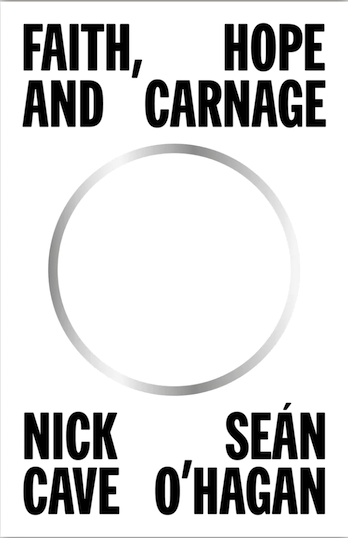The mark of a book’s wisdom – in this book anyway – is the number of dog ears. As you see here, Nick Cave and Sean O’Hagan collaboration Faith, Hope & Carnage has provided meaningful thoughts and lightning-bolt revelations front to back.
The fruit of a series of lengthy phone conversations between 2020 and 2021, it examines Cave’s loci of inspiration, open-ended practice, personal theology (an approach to religion he describes as “spirituality with rigour”) and his incredible resolve like never before. And that’s saying something, given the length of his career and all the interviews he’s given.
Cave is probably one of the most generous, open and articulate public figures in music, an artist whose creations are always intimate and true reflections of his being. Considered, even poured over. And yet he sees his work as incomplete in a sense. As a vessel into which others pour meaning. “What I do is entirely relational,” he says, “actually transactional, and has no real validity unless it’s animated by others.” Wisdom, in this regard, is knowing how far we have to go as Anthony Bourdain noted.
Cave puts himself out there. It’s a compulsion. He was the distraught father who took to the stage in a series of public ‘inquisitions’ (Variety called it “group therapy”) without having many answers to his own grief. Cave also attempts to address the curiosities, frustrations, ills and injustices of society through his weekly liturgical Red Hand Files, which have “created a kind of ever-creeping transparency by slowly prising me open”, he explains. “They freed me from myself”.
I and thousands of others across the world have come to rely on this correspondence, this antiquated exchange, to make sense of a world that tips ever closer into chaos and conflict on multiple fronts (a “collective lunacy”, in Cave’s eyes). Though he is also happy to answer the comparatively banal (“Who would you like to win Love Island?”) and silly (“Have you ever met Nicolas Cage?”).
On grief, in particular, he offers great comfort and ballast. Having now lost two sons, his mother Dawn and close friend/ex-partner Anita (“an astoundingly valuable human being”), he lives in defiance as much as anything. I can certainly relate to that impulse. Read more about his intentions for the book here.
Don’t expect copious ‘behind the scenes’ insight, an encyclopaediac trawl through the discography or a VH1-style retrospective complete with backstage gossip. But we are transported to the conception of the bruised and bereft Skeleton Tree (which became a form of “radical connectivity” when played live) and, in fleeting moments, feel relative release in the imagery of its follow-up Ghosteen. We are also invited into the endearing bromance with right-hand man Warren Ellis, who also has a book out.
When O’Hagan presses him about songwriting and the purpose of music, Cave uses words such as salvation, absolution, forgiveness and healing. And with real intention. In the context of personal disappointment, catastrophe or devastation, art becomes a means of survival. In Cave’s hands, the song is an act of transformation or transference – a form of supplication, at times – a way to pick up the pieces and move beyond.
Those are the stakes at play in his world, a life in which he has learned to live in uncertainty and by divine possibility. In that time he has gone from running on the burning intensity of youth and rebellion to a form of spiritual audacity or zeal as he puts it. Cave’s depth of faith, in both the religious and quasi-religious sense, is what makes him such a compelling and crucial artist. Perhaps it’s also what’s allowed him to withstand so much and still be alive to raw experience.
When talking about his hands-on passion for ceramics, he offers this advice to budding creative folk: “Learn as much as you can about their craft … but ultimately trust your own impulses. Have faith in yourself, so you can stand beside what it is that you have done and fight for it, because if you invest in it with that faith, then it has its own truth, its own honesty, its own resilient vulnerability and hence its own value.”
Credit to writer and critic O’Hagan for facilitating these lengthy discussions, giving Cave space to expand on opinions and observations, while lightly steering the course and challenging him along the way. He is a sparse yet elucidating presence. Well, that’s how it feels on the page anyway, post-edit. They have known each other for more than 30 years, so there is mutual respect and a rapport they can build on. But that familiarity can breed an overly casual or easy exchange. Not here.
The pandemic must have been a double-edged sword: offering the chance to talk at length amid the enforced isolation of lockdown, with fewer distractions, but then straining to make sense of the shared tragedy of it all as COVID ruptured our sense of time and space.
Chew slowly and savour all that comes to mind. And come back to it when you need it. Faith, Hope & Carnage is restorative and will galvanise your spirit.
PS I recommend watching this Newsnight interview about the book. Cave’s conversation with Kirsty Wark in the theatre is interspersed with atmospheric performances on piano.







